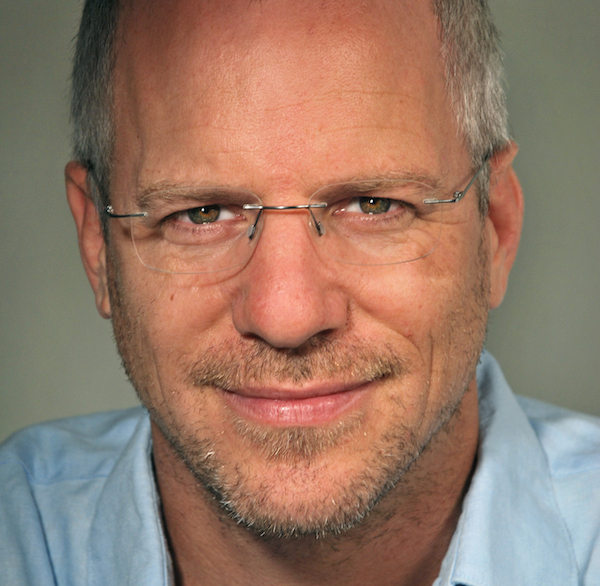Amos Elkana

Award-winning composer, guitarist, and electronic musician Amos Elkana (born in Boston in 1967, raised in Jerusalem) creates genre-blurring works that bridge the realms of sound, language, and memory. He began his musical journey with the electric guitar at 15, and in 1987 returned to Boston to study jazz guitar at the Berklee College of Music and composition at the New England Conservatory. He later expanded his sonic palette with an MFA in electronic music from Bard College.
Amos Elkana’s upcoming albums—Que sais-je? (New Focus, releasing July 4, 2025) and Gefunden (NEOS, scheduled for release in September 2025) — showcase his latest explorations in chamber, solo and electroacoustic composition. Que sais-je? is an ambitious 64-minute work for ensemble, electronics, and voices, interweaves philosophical texts and archival recordings into a rich and immersive sonic tapestry.
Formative exchanges with composers such as György Kurtág, Peter Eötvös, George Lewis, Helmut Lachenmann, Josef Tal, and Pauline Oliveros deeply shaped his musical voice, infusing it with both structural rigor and expressive freedom.
His compositions—spanning orchestral, chamber, vocal, and electroacoustic idioms—have been performed by leading ensembles such as the Berlin Symphony Orchestra, Israel Symphony Orchestra, Warsaw Philharmonic, Meitar Ensemble, UMZE Ensemble, Moscow Soloists, Tel Aviv Soloists, and many others. His works have been featured at Carnegie Hall, Konzerthaus Berlin, the Tel Aviv Museum of Art, and the Gasteig Auditorium in Munich.
Elkana's music has been showcased at major international festivals including the ISCM World Music Days in Sweden (2009), China (2018), and South Africa (2023); the Mise-En Festival in New York; the Festival de Royaumont in France; REAKTOR in Vienna; and others.
He has been commissioned by prestigious institutions including the Siemens Foundation, Berlin Festspiele, the Israel Council for the Arts, and the Rabinovich Foundation. Key works include his clarinet concerto Tru’a, recorded by Grammy-winner Richard Stoltzman; the award-winning song cycle Arabic Lessons; and the opera The Journey Home.
In its review of Arabic Lessons, the Jerusalem Post called it "a perplexing, beguiling 40-minute opus in which the composer challenges the so-called 'acceptable' form of the lieder, shattering it and building it anew, as if constructing a new world from its ashes... one of the most significant works composed in Israel for quite a while."
In 2006, Elkana composed Eight Flowers for solo piano in honor of György Kurtág’s 80th birthday. It premiered that year during a festival celebrating Kurtág at Schloss Neuhardenberg near Berlin and has since been performed widely, including at the ISCM World Music Days in Sweden.
Elkana’s compositions have been conducted by prominent figures such as Ilan Volkov, Robert Black, Jerzy Swoboda, Konstantia Gourzi, Frédéric Chaslin, Fabián Panisello, and Gergely Vajda.
Elkana has received numerous honors, including the Prime Minister’s Prize for Music Composition (2011), praised by the jury as the work of “very original music, independent of the prevailing fashion, guided by unique and delicate taste,” and the Rozenblum Prize for Excellence in the Arts (2012), awarded “for his musical works and for being a prolific, active and imaginative composer.”
In 2013–2014, Elkana was a fellow at the International Research Center 'Interweaving Performance Cultures' in Berlin, where he developed his opera Nathan the Wise.
He has taught composition and electronic music at institutions including UC Santa Cruz, the Munich Academy of Music and Theater, Academia de Muzică Gheorghe Dima in Cluj-Napoca, the Jerusalem Academy of Music and Dance, Buchmann-Mehta School of Music, Rimon School of Music, and the Musrara School of Art in Jerusalem.
A founding member of the Triple Helix Guitar Trio, Elkana merges classical and electric guitar with electronics, improvisation, and multimedia elements in a contemporary chamber context.
Elkana holds American, German, and Israeli citizenships but does not identify with any nation. Inspired by philosopher Kwame Anthony Appiah, he embraces a cosmopolitan ethos grounded in multilingual texts, cross-cultural collaborations, and music that transcends national and aesthetic boundaries often drawing inspiration from diverse musical traditions and languages.
Awards
- 2019 Grant Rabinovich Foundation (Tel Aviv)
- 2017 Grant Rabinovitch Foundation (Tel Aviv)
- 2017 Grant Mifal HaPais Council for the Culture and Arts (Israel)
- 2016 Grant Mifal HaPais Council for the Culture and Arts (Israel)
- 2015 Grant Rabinovitch Foundation (Tel Aviv)
- 2014 Grant ACUM (Ramat Gan, Israel)
- 2013 Fellowship International Research Center "Interweaving Cultures in Performance" (Germany)
- 2012 Prize Rozenblum Prize for excellence (Israel)
- 2012 Grant Rabinovitch Foundation (Tel Aviv)
- 2011 Prize Prime minister Prize for Music Composition (Israel)
- 2011 Grant ACUM (Israel)
- 2010 Fellowship Civitella Ranieri Foundation (Italy)
- 2009 Grant Culture Foundation of the Israeli Lottery (Israel)
- 2008 Grant Culture Foundation of the Israeli Lottery (Israel)
- 2008 Grant American Music Center - CAP grant (USA)
- 2007 Grant Rabinovich Foundation (Israel)
- 2006 Fellowship Lucas Artists Residency Program (USA)
- 2006 Scholarship Bard College (USA)
- 2005 Scholarship Bard College (USA)
- 2004 Grant Israel-America Culture Foundation (Israel)
- 2004 Scholarship Bard College (USA)
- 2004 Scholarship Conductors Institute (USA)
- 2004 Grant Rabinovich Foundation (Israel)
- 2003 Fellowship Music OMI (USA)
- 2002 Prize ACUM Golden Feather prize for Composition (Israel)
- 1993 Grant Tytte and Lillemor Faurschou's Foundation (Denmark)
- 1989 Scholarship New England Conservatory of Music (USA)
- 1987 Scholarship Berklee College of Music (USA)
Education
- 2007Bard CollegeUnited States
Master of Fine Arts - 2004Conductors InstituteUnited States
Composer-Conductor Program - 1994Brandenburgisches Colloquium für Neue MusikGermany
Master Class in Composition with Edison Denisov and Paul Heinz Dittrich - 1993Erik NorbyDenmark
Composition studies - 1992Michèle ReverdyFrance
Private composition lessons - 1990The New England Conservatory of MusicUnited States
Composition - 1987Berklee College of MusicUnited States
Guitar
Amos Elkana
P.O.Box 11159, Tel Aviv 61111, Israel
Tel. +972 54 4799457
Homepage: www.amoselkana.com | Email: